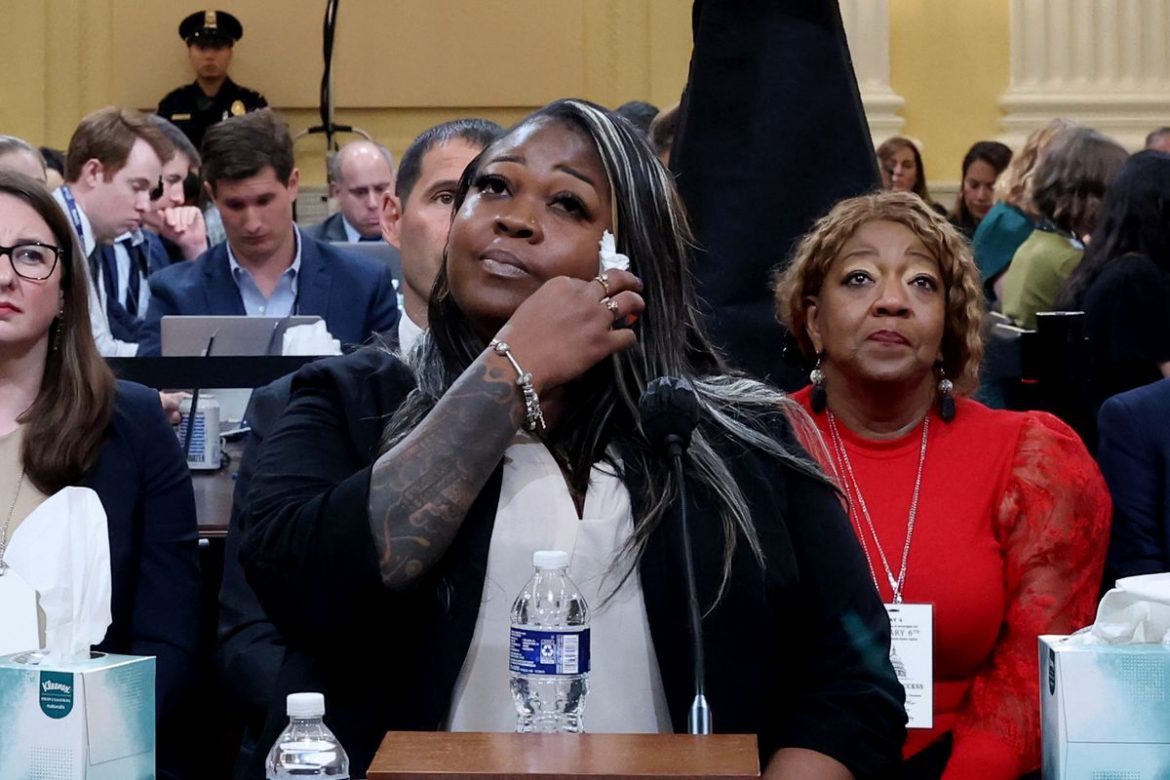Witnesses at the latest January 6th hearings share an experience that, since Donald Trump, has become a hallmark of politics: being terrorized by the full modern machinery of American hate-mongering.
By the usual political categories, there isn’t much of a link between Rusty Bowers and Shaye Moss. In late 2020, Bowers was the speaker of the Arizona House of Representatives, a white Republican in his late sixties, with a fondness for Ronald Reagan. On the opposite side of the country, Moss was a little-known election worker, a registration officer in Fulton County, Georgia, who prided herself on insuring that fellow Black voters could be counted in a state where they had been so often excluded.
But Bowers and Moss share an experience that is now a hallmark of contemporary politics: both have been terrorized by the full modern machinery of American hate-mongering, a system of demonization that flourished under the Trump Presidency and has continued to grow. Trump’s political formula has rested on a dark genius at leveraging the powerful against the vulnerable, a tribe against a dissenter, the mob against the foe—and he nearly succeeded in using that recipe to overturn the election that he lost.
The House select committee investigating the storming of the Capitol on January 6, 2021, in its first three hearings, focused tightly on the dramas and the schemes that unfolded in the White House. Witnesses reported what they described as a drunken Rudy Giuliani (he denied it) advising Trump to declare a fraud, even as votes were still being counted; former Attorney General William Barr recalled telling the President that the “claims of fraud were bullshit”; and the lawyer John Eastman requested a pardon as he continued to press Vice-President Mike Pence to break federal election law.
The fourth hearing detailed yet another dimension of potential illegal activity: efforts by the outgoing President and his allies to subvert the Electoral College by introducing slates of fake “electors,” Trump supporters who had signed false, homemade certifications. In a deposition video, Ronna McDaniel, the Republican National Committee chairwoman, testified that Trump put Eastman on the phone with her to discuss the “importance of the R.N.C. helping the campaign gather these contingent electors.” The committee also showed that the plan reached the halls of Congress on January 6th, shortly before it was overrun by rioters. In text messages, an aide to Senator Ron Johnson, Republican of Wisconsin, told a member of Pence’s staff that Johnson wanted to “hand” Pence a list of Trump-organized electors from Michigan and Wisconsin, two states that the President had lost. Pence’s aide, Chris Hodgson, texted back: “Do not give that to him.” (After the hearing, Johnson told reporters that the episode was a “nonstory,” that he did not know where the list of fake electors originated, and added, “I wasn’t involved.”)
Details of the fake-elector scheme immediately heightened calls for the Department of Justice to prosecute those responsible, but the hearing’s most distinctive effect was a shift in focus and emotional register, from the interior mechanics of an attempted palace coup to its reverberations across the country. In ways both distressing and inspiring, the committee illuminated the experience of ordinary public servants who refused to succumb to the pressures of tribal kinship, delusion, and threats.

Before the witnesses spoke in the hearing room, the committee played a powerful series of vignettes from across the country, such as the voice of Jocelyn Benson, Michigan’s secretary of state, who recalled the night that Trump supporters first protested outside her home. “My stomach sank, and I thought, It’s me,” she said. “Are they coming with guns? Are they going to attack my house? I’m in here with my kid, you know. I’m trying to put him to bed.” There were voice mails from Giuliani to state officials (“I just want to bring some facts to your attention and talk to you as a fellow-Republican”) and descriptions of life under assault. “All of my personal information was doxed online,” Bryan Cutler, the speaker of the Pennsylvania House of Representatives, recalled. “In fact, we had to disconnect our home phone for about three days, because it would ring all hours of the night and would fill up with messages.” The committee showed a snippet of a live-streamed talk show in which Nicholas Fuentes, a white nationalist, told his audience, “What can you and I do to a state legislator? Besides kill him. Although we should not do that. I’m not advising that, but I mean what else can you do, right?”
When Bowers, of Arizona, spoke, he seemed well chosen as a foil to the usual Republican effort to dismiss the proceedings as, in the words of a Fox News article, “a partisan exercise to kneecap Trump ahead of a potential 2024 run.” By his own description, Bowers is a rock-ribbed conservative who voted for Trump in the 2020 election. Days later, he and his wife were returning from church when he answered a phone call from the White House. “It was on a Sunday, and we were still in the driveway,” he said, speaking with half-glasses at the end of his nose. He recalled Giuliani saying that “two hundred thousand illegal immigrants” and “five or six thousand dead people” voted in Arizona. When Bowers asked for names, he heard Trump say, “Give the man what he needs.” At some point, Bowers said that Giuliani told him, in an instantly immortal line, “We’ve got lots of theories. We just don’t have the evidence.” When Giuliani asked him to remove the electors for Biden, Bowers said, “You are asking me to do something against my oath, and I will not break my oath.”
For all that drama, one of the most memorable images was not of the crucial moments when Bowers resisted Trump’s pressure but of the treatment that he has endured since, in what he called “a pattern in our lives, to worry what will happen on Saturdays.” That is when the “various groups come by,” he said, “and they have had video-panel trucks with videos of me, proclaiming me to be a pedophile and a pervert and a corrupt politician and blaring loudspeakers.” These groups stop and argue with people who live nearby. In particular, Bowers remembered a harasser wearing a militia insignia on his chest. “He had a pistol and was threatening my neighbor. Not with the pistol, but just vocally. When I saw the gun, I knew I had to get close.” Bowers said, “We had a daughter who was gravely ill, who was upset by what was happening outside. And my wife is a valiant person—very, very strong, quiet, a very strong woman.” (Their daughter died in late January.)
In raw political terms, the shock of Bowers’s testimony derived partly from the fact that he comes from a slice of American demographics that, by all traditions, is privileged to avoid the kind of right-wing intimidation visited upon him. He was, in theory, an ally, a fellow Republican grandee, until the moment his conscience put him on the endangered side of Trump’s essential calculus: us versus them. (In fact, a day before his testimony, Bowers told reporters that, if Trump were again the nominee in 2024, he’d vote for him “simply because what he did the first time, before covid, was so good.”) The hearings featured other low-ranking Republicans who defied Trump, some of whom are, by now, well known, such as Gabriel Sterling, the Georgia election official who pleaded for an end to the lies about a stolen election (“Someone’s going to get killed”), who despaired at the prospect of overcoming Trump’s megaphone, he told the committee, because it was “like a shovel trying to empty the ocean”; and Brad Raffensperger, Georgia’s secretary of state, who resisted Trump’s threats of criminal prosecution, in a notorious call that lasted more than an hour, during which the President said, “I need eleven thousand votes. Give me a break.”

Shaye Moss, on the other hand, never had the choice to get on Trump’s side. She was cast as an enemy from the outset. She came to public attention in early December, 2020, when one of Trump’s lawyers showed a Georgia state-legislative committee segments of surveillance footage from Election Night. The lawyer falsely claimed that the video showed Moss, and her mother, Ruby Freeman, who was also an election worker, withdrawing eighteen thousand fraudulent ballots from a suitcase, and feeding them into voting machines. The fiction took flight, trafficked by right-wing media outlets such as the Gateway Pundit, which labelled Moss and Freeman “crooked Democrats.” In another hearing, before the Georgia legislature, Giuliani named the women again and invoked naked racist tropes, saying that the footage showed them “surreptitiously passing around USB ports as if they are vials of heroin or cocaine.” (In fact, Freeman was giving her daughter a mint.)
Moss, in her testimony before the committee, began in a small, trembling voice, glancing upward at the ceiling in the moments she needed to gather herself. Seated behind her was her mother, who is well known in their community as Lady Ruby. Trump’s allies made Moss and Freeman recurring figures in their tweets and comments, and continued to recycle accusations of fraud in Fulton County all the way up to his speech on the morning of January 6th, at the Ellipse.
In testimony that should become required viewing for every new member of Congress and every new employee of a social-media network, Moss described the vile cascade of threats and racist taunts that she discovered in her Facebook messages. (One of the “threats wishing death upon me,” she said, included the message, “Be glad it’s 2020 and not 1920.”) Her life, today, is unrecognizable. “I don’t want anyone knowing my name,” she said. “I don’t want to go anywhere with my mom, because she might yell my name out over the grocery aisle, or something. I don’t go to the grocery store at all. I haven’t been anywhere at all. I’ve gained about sixty pounds. I just don’t do nothing anymore. I don’t want to go anywhere. I second-guess everything that I do.” She said, “All because of lies. For me doing my job—same thing I’ve been doing forever.” She described receiving a call from her grandmother, when Trump supporters entered her house. Moss said, “I’ve never even heard her or seen her cry ever in my life. And she called me screaming at the top of her lungs, like, ‘Shaye, Shaye, Oh, my gosh, Shaye.’ ” Moss went on, “They knocked on the door, and, of course, she opened it seeing who was there, who it was. And they just started pushing their way through, claiming that they were coming in to make a citizen’s arrest. They needed to find me and my mom.”
The most enduring words from the day may have come from Lady Ruby, who described the life she has been left by Trump’s efforts to make her a public enemy. “Do you know how it feels to have the President of the United States target you?” she asked. “The President of the United States is supposed to represent every American, not to target one. But he targeted me, Lady Ruby, a small-business owner, a mother, a proud American citizen, who stands up to help Fulton County run an election in the middle of the pandemic.”
The hearings of the January 6th committee have already documented many points of failure in modern American life, chiefly the awesome power of an elected official, with a Twitter account, determined to break a two-hundred-and-forty-six-year tradition of Presidential transfers of power. But the violence that occasioned this committee must be understood as more than sui generis; it is, rather, an outgrowth of a violent style of American politics that proliferated under Trump and has intensified since he lost reëlection.
In the days and hours leading up to the latest hearing, a Republican member of the committee, Adam Kinzinger, of Illinois, posted the text of a letter mailed to his house which threatened to execute him, as well as his wife and their five-month-old child. Meanwhile, Eric Greitens, a candidate for the U.S. Senate from Missouri (who resigned as governor of that state, in 2018, amid allegations of sexual assault, invasion of privacy, and other abuses—which he denied), released a campaign ad in which he calls for voters to “hunt down” rinos, or Republicans in name only. Holding a shotgun, and accompanied by a team of men in tactical gear, he says, “Join the maga crew. Get a rino-hunting permit. There’s no bagging limit, no tagging limit, and it doesn’t expire until we save our country.”
Greitens is currently the front-runner in his Senate contest, and he leads Democrats in polls. (The primary is on August 2nd.) The prospect of his regaining public office will be a measure of America’s peril and its capacity for self-correction. But already we know of another bleak measure: when Moss was asked how many of her colleagues, in the video, have stayed in election jobs in the face of threats and abuse, she reported that none of them remained. “Everybody left,” she said.


